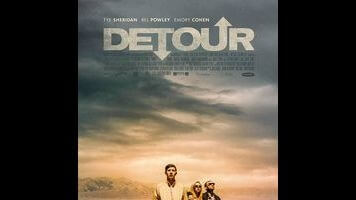But then, is it really believable that this archetypal prepster patsy, never seen without his banana-yellow windbreaker, would have a one-sheet for the Paul Newman private-eye flick Harper hanging on his bedroom wall? Say what you will about the early films of Quentin Tarantino or the knock-offs that followed them, but at least their motor-mouthed characters always knew what kind of movie they were in. The same can’t be said about Harper or Johnny Ray (Emory Cohen), the career criminal who shows up at his door after a drunken barroom conversation in which Harper quoted $20,000 as the figure he’d be willing to pay for someone to off his stepfather. Accompanied by his stripper squeeze Cherry (Bel Powley, in what might be called “the Rosanna Arquette role”), Johnny Ray is one of those sexually threatening, quasi-psychopathic thugs that seem to lurk in the back of every dive bar and lap dance joint in moviedom, swilling bottled beer while they wait for some unsuspecting everyman to come through the door.
What follows—a trip to Vegas in an early ’70s Mustang, a kidnapping, a couple of twists—is diverting enough, though none of its feels motivated by a psychology of desperation. The gimmick of the script (it involves split-screens) at first suggests cosmic cynicism, but eventually falls into place as something that’s both less potentially alienating and more contrived. High artificiality is the order of the day; Smith, the English writer-director of Severance and director of Black Death, has a questionable grasp of American vernacular grammar and speech, and the fact that the movie was filmed in South Africa with a largely non-American cast just adds to the impression of remote, bogus nowhere-ness. He also shoots more or less exclusively with very wide-angle lenses, so that everything curves and stretches toward the edges of the frame, occasioning feats of labored blocking in order to keep the actors’ faces in the more flattering center.
It makes for some interesting compositions, in a purely showy look-at-me way—say, a shot of Harper going up a staircase that’s framed upside down and at a Dutch angle, so that it looks like the young man is strolling through an M.C. Escher print. But it never merges into anything. Even the most derivative of those ’90s neo-noir programmers felt like they came from some underbelly of cinema. But Detour is just film-school-ish synthesis, right down to the cinematography-midterm shot lit through venetian blinds and the anachronistic analog static on the motel room TV—the story of a young man who hates his stepdad so much that he stumbles right into an over-complicated thriller set-up that can only be watched once.

